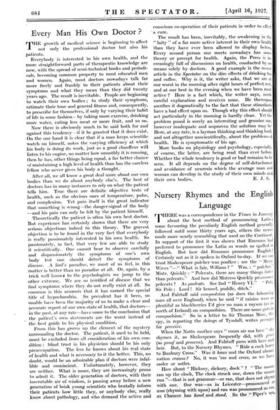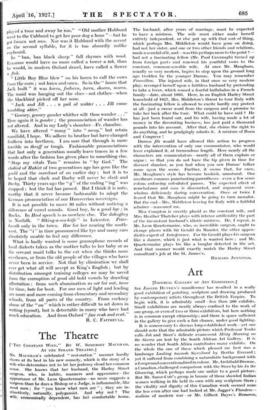Nursery Rhymes and the English Language T HERE was a correspondence
in the Times in January about the best method of pronouncing Latin ; some favouring the peculiarly English method generally followed until some thirty years ago, others the newer mode more nearly resembling that used on the Continent. In support of the first it was shown that Erasmus had preferred to pronounce the Latin as words so spelled in English. But how did Erasmus pronounce English ? Certainly not as it is spoken in Oxford to-day. If we can trust Shakespeare pulcher was poolker : see the " Merry Wives "—" What is fair, William ? " Wm.: " puleher." Mistr. Quickly : " Polecats, there are many things fairer than polecats." And how did Mistress Quickly pronounce polecats ? As poolcats. See 2nd " Henry VI." " Pole, Sir Pole ; Lord ! Sir kennel, puddle, ditch."
And Falstaff said compoolsion (as does the labouring man all over England), when he said " if raisins were as plentiful as blackberries I'd give no man a rayson (as in north of Ireland) on compoolsion. There are some guts in compoolsion." So in a letter to Sir Thothas More, the spy, in reporting the doings of Tyndall, writes persayve for perceive. When the Notts mother says " coom air ma hive " she rhymes it, as Shakespeare frequently did, with prove (so proof and prooven). And Falstaff puns with here and heir. But, to the Nursery Rhymes. " Ride a cock horse to Banbury Cross." Was it haws and the Oxford abomi- nation crawss? No, it was 'oss and cross, as we have ossler or ostler.
- How about " Hickory, -dickory, dock ? "-The mouse ran up the clock, The clock struck one, down the mouse run "—that is not grammar—or ran, that does not rhyme with one. One wa:s—as in Leicester—pronounced as won (rhyming with Upon) and ran was pronounced as roil, as Chaucer. has hand and Stond, . So the ." Piper's so."' played a tune and away he ion." " Old mother Hubburd went to the Cubburd to get her poor dog a bone "—but he got known not nun. Nor was it Hubbard with the accent on the second syllable, for it is too absurdly unlike 'cupboard. . . baa, baa black sheep " full rhymes with wool. Erasmus would have no more called a tower a tah, than he would, in modern Oxford drawl, have called a flower a fink " Lithe Boy Mire blew " on his horrn to call the cows corn from the co ; not hazel and yawn. So in the " house that . .
Jack built " it was horrn, fork rrn, torrn, shorrn, morrn. The maid was, hanging out the does—not clothes—when the blackbird picked off her nose.
" Jack and Jill . . . a pail of wahter . . . Jill came tumbling ahter."
" Goosey; goosty gander whither wilt thou wander . . ." Here again it is gonder ; the pronunciation of wander has not altered. And in my Lady's shomber—Fr. chambre.
We have altered " many " into meny," but retain manifold, I hope. We adhere to brother but have changed brothern into brethren. I am sure that through is more forcible as thruff or tough. Fashionable pronunciations that last only a generation usually leave traces in a few Words after the fashion has given place to something else. " Stap my vitals Tarn " remains in " by Gad." The ehahiot of Hahiet of two generations ago has gone like the goad and the marchant of an earlier day ; but it is to be hoped that clerk and Darby will never be clurk and &Ay. Thirty years ago the "g" of the ending " ing" was dropped ; but the fad has passed. But I think it is note_ worthy that it never became fashionable to adopt the German pronunciation of our Hanoverian sovereigns.
It is not possible to move 80 miles without noticing a difference of vowel sounds. Good boy, be a good bye ; in Bucks. in Hoot speech is as nowhere else. The dahngkey in Norfolk. "Sthing-a-ma-loife " in Leicester. Peter-- Loral only in the town. Har for her nearing the south- west. The " i " in time pronounced like tye and many cars absolutely unable to feel any difference.
What js badly wanted is some gramophone records of local dialects taken as the mother talks to her baby or as the servant maid talks to the eat when she thinks none overhears, or from the old people of the villages who have never been in service. Not that by elimination we shall ever get what all will accept as King's English ; but by distribution amongst training colleges we may be saved from the corruption of good old bold vowels by drawling affectation : from such abomination as oat for out, tame for time, (lute for boot. For our men of light and leading arc more and more coming from elementary and secondary schools, from all parts of the country. From cockney abuse of the " ou " which is rather difficult to set down in writing (eyout), but is detectable in many who have had much education. And from Oxford "fru: evah and evah."
R. C. FAITHFULL.



































 Previous page
Previous page